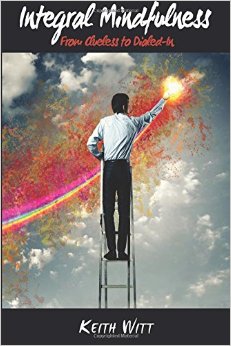This is the book I wish someone had given me in my 20s. It would have saved me a lot of trouble.
Like young seekers in all times and places, I was looking for the right things to believe in and the right ways to live. I was mad at my religion of origin, Christianity, but how about Buddhism? Of course I needed therapy, but should it be Freudian, gestalt, NLP, wilderness? How about meditation? Martial arts? Which teachers (and what about their flaws)? Does any of this even matter? What is enlightenment anyway? What the heck is even normal?
Oh the struggles Dr. Keith Witt could have saved me.
But no, I was left to kiss frogs, which I did with a dilettante’s abandon. Funny thing is they all, in one way or the other, turned into a Prince. I gained something precious and unique from every retreat I attended (clothed and naked), every therapy session, every self-help book, and every evening talk with every swami, arhat and tulku who ever traipsed through the people’s republic of Boulder.
Handsome princes all, but I never knew which ones to believe because they all contradicted each other. Is it God or Emptiness? Should I build my personal power or dismantle my ego? Are other people my mirror or my guides? Is everything a projection of my mind, or is my mind a projection of my brain?
Help! They didn’t just disagree, they negated each other, and often vilified each other in their claims to be the one true path.
Help came eventually when I stumbled upon integral theory and the writings of Ken Wilber, which provided a larger framework that included — and illuminated — the whole field of transformation.
The integral thesis is simple: every spiritual and psychological tradition holds a piece of the Truth, a piece that no other tradition offers. Each is a work of art, the art of human development, and some are masterworks.
When we see transformation through this lens we become more friendly to all practices and lineages, and understand how they all fit together into a richer whole. Integral theory thereby renders the gifts of any single tradition both more accessible and more profound.
The fundamental integral insight provides more complete answers to the ultimate questions of being human: “Who are we? What are we doing here? How shall we live?” This wider, more inclusive perspective helps us to bring more loving intelligence to all the important areas of our lives: intimacy, family, work, sex, health and spirituality.
In Integral Mindfulness: Clueless to Dialed-In, Dr. Keith Witt provides a handbook for integral living. He is most qualified to do so. As a psychotherapist in private practice, he has been helping people heal and grow for over 40 years. If we consider 10,000 hours of practice to be the rough requirement for attaining mastery in any discipline, Keith is a master five times over, having conducted more than 50,000 therapy sessions in his career. When it comes to the human condition he has seen and heard it all.
Keith is also a virtuoso of integral thinking, and his work, teachings and many books have been illuminated by the power of the integral vision. He has personally studied and practiced in many traditions. He is an expert in the flourishing science of the brain and mind. Centered in Santa Barbara, California, he has been at the forefront of the latest psychotherapeutic thinking,
So whether Keith is addressing a troubled marriage or difficult co-workers or spiritual longing, he brings an integrated essence (a new “simplicity beyond complexity”) of the best practices of psychotherapy, brain training and spiritual insight. Keith is a master simplifier, metaphor maker, installer of sticky ideas.
I met Keith ten years ago, as the community of integral practitioners was beginning to form worldwide. Since then he has become a leading thinker and teacher of integral, mindful living, perhaps best known for his Therapist in the Wild video series, where he “tells truth, spreads love, and takes fearless stands on the great issues of the day — sex, relationships, men, women, sex, pleasure, bullshit, sex, hypocrisy and sex.” In Integral Mindfulness: Clueless to Dialed-In you’ll get all this and more!
Thank you, Brother Keith, for your basic friendliness to life and its struggles. Thank you for this book that shows us how to see, experience and express ourselves in ways that both reveal more of who are, and help us contribute our best to each other and our world.
Jeff Salzman, Boulder Colorado
The series of conversations between Jeff Salzman and Dr. Keith Witt is called The Shrink & The Pundit.






